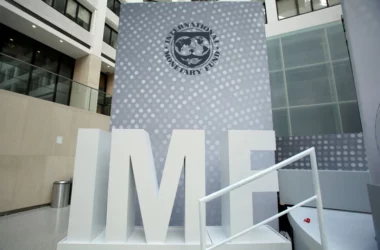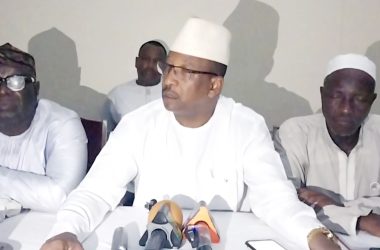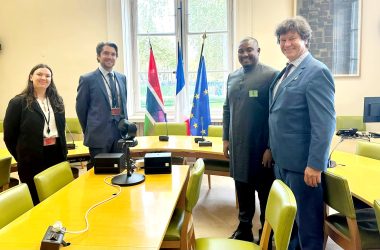
It does not take a rocket scientist to figure out that post-Jammeh Gambia is now unstable and becoming ungovernable.
Indeed, these are worrying times for the country. Under the surface of normality in the country, a deep-seated anger is buried; and needless to say, the authorities in the Gambia are not paying heed or attention to this dark underbelly of Gambian society. Yet, the writing has been on the wall for some time now.
In short, beneath the surface of normal life in Gambia are underlying tensions and divisions that have always existed in the country, but have largely remained dormant for several years – during the Jammeh years. However, it is the post-Jammeh period that has laid bare the extent and gravity of these tensions, polarizations, and divisions in the country.
To understand post-Jammeh Gambia’s contemporary problems, we need look further than the events of yesterday in the country, following a series of public demonstrations held in Brikama and Serekunda.
The seeds of the current crisis gripping post-Jammeh Gambia were sown over two decades ago, when Jammeh seized power in July 1994 to be precise, but sadly, the failure of the Barrow administration to attempt to address the legacy of Jammeh has aggravated the situation.
Therefore, the violent protests we saw in the Gambia on Wednesday, were not just the work of a few small-minded young people in the country, but they rather reflected the failure of the political leadership in the Gambia to come up with a vision to meet the needs and aspirations of Gambians, especially our young people.
Regrettably, the anarchy and lawlessness we saw yesterday on our streets are just the tip of the iceberg. The destruction Gambians witnessed on Wednesday is only the tip of the iceberg, I repeat. In fact, there has been an upsurge in violent incidents in the country since Barrow became President.
In my view, yesterday’s protests, as ugly and violent as they were, were only a small test for the Gambian authorities vis-à-vis what is to come (or to be expected) in December 2019; and regrettably, the security forces in the country failed very badly.
The‘Operation 3 Years Jotna’, a group calling on President Barrow to step down in December 2019 after three years in power, in line with the coalition agreement, is not prepared to budge on the issue. Members of the group and their supporters are planning to take to our streets in December 2019 to demand that President Barrow steps down.
Therefore, Barrow will have to navigate or negotiate a tricky path on the one hand, between his desire to prolong his stay in power, and on the other hand, the 3 years Jotna’s demand for him to step down in December, both of which positions seem to be irreconcilable. And it is not also difficult to identify a number of potential flashpoints in the country and these possible hotpots throughout the country, if not handled carefully and effectively, could easily develop and lead to the civil unrest, possibly even rendering the Gambia ungovernable.

Post-Jammeh Gambia is, without doubt, now a country on a knife edge between hope and despair. The path ahead is not going to be easy, but whether or not the country implodes is dependent on the immediate and future actions of its current leaders, particularly President Barrow.
However, how things fare over the next few months will determine whether or not the so-called new Gambia will become a stable country or whether the current cycle of violence will continue, as President Barrow continues his consolidation of power and authoritarianism.
Yet, for now, the future looks uncertain, as the coalition government has demonstrated over and over again, its unwillingness or inability to fulfil their promise for economic prosperity and political inclusion. In fact, it would be an understatement of the year to say that the (political) situation in the Gambia is more precarious than at any time since the December 2016 election defeat of President Jammeh, reflecting, to a very large extent, the Barrow government’s inability to effectively manage the political transition process.
In my view, the roots of the current crisis gripping post-Jammeh Gambia are not just economic but also political, largely caused by betrayal, lies, deception, broken promises and political expediency on the part of Barrow. President Barrow, and some of his APRC allies, are looking for ways to extend his (Barrow’s) rule beyond the end of his current presidential term. To this end, President Barrow is now in bed with alleged APRC murderers. New wine in old bottles truly represents the truth about Adama Barrow presidency, as he continues to recycle APRC waste into his government.
Just look at the case of the ailing Dr Sedat Jobe, who until recently, was Gambia’s ambassador to France. Although Sedat Jobe worked for Jammeh as Foreign Affairs Minister, he would later resign and repent his hasty and poor judgement. Sedat subsequently, joined the Gambian diaspora struggle from his base in Dakar, in order to unseat Jammeh from the Gambian presidency; and needless to mention, Sedat Jobe played a very useful role in Senegal where he became a spokesman, so to speak, for the Gambian opposition in the diaspora.
Now, Sedat Jobe has been recalled to Banjul, as his diplomatic contract has not been renewed, after it expired in May 2019, because he is perceived to be a close associate and relative of UDP Leader, Lawyer Ousainou Darboe. Dr Sedat Jobe, I have been reliably informed, is presently sick and may have been hospitalized in Paris, and has therefore, asked to be given additional time or extension until September 2019 to allow him to finish his medical treatment but the Gambia government (or its Foreign Minister Dr Mamadou Tangara to be precise) has been threatening to kick Sedat Jobe out of his house in Paris, which was given to him by the Gambia government.
An African diplomat in Paris, just the other day, expressed concern to me over, regarding the continuous shameful and inhuman treatment being meted out to Sedat Jobe by authorities at the Gambia’s Ministry of Foreign Affairs, who are insisting that Sedat be removed from his home in Paris, and sent to Banjul, in spite of the fact that he (Sedat) is very sick.
Meanwhile, the Surahata Janneh Commission of Inquiry, which was set up to look into the financial and other business-related activities of ex-president Jammeh and his allies, submitted its report since March 2019, but Barrow is reluctant to act on it – avoiding to offend his APRC backers and supporters.
In May 2019, the Ministry of Justice issued a press release, calling on all those who have been notified of being adversely mentioned in the Janneh Commission report to contact the Attorney General chambers urgently. But Barrow, I have been reliably told, has made it loud and clear that he wants “those adversely mentioned in the Janneh Commission” to be asked to repay or refund the monies they have (allegedly) embezzled, instead of bringing any economic crime charges against them.
Recently, Fabakary Tombong Jatta, the leader of APRC, during a press conference, disclosed that negotiations had begun between the Barrow administration and ex-president Jammeh, so that the exiled ex-president can return to the Gambia in due course. But the government was swift to refute claims that officials of the APRC were in serious negotiations with President Barrow’s government for Jammeh’s return to Gambia at the appropriate time.
A government press release stated that the reports were not true, but of course, there is no smoke without fire. Based on the information I have gathered from a reliable source – it appears that as Barrow contemplates forming his own political party in due course, indeed there has already been some kind of political horse-trading between Barrow and those representing the interests of ex-president Jammeh, one of them thought to be the President of Mauritania, while he (Barrow) is trying to form his political party.
On the reported Jammeh ‘amnesty’ issue, a Western Diplomat told me that Gambia’s Foreign Affairs Minister and the Attorney General are NOT singing from the same song sheet and therefore, felt that Barrow should try and bring the two ministers together, so that they are all singing from the same hymn sheet.
My diplomatic source has further told me that Dr Mamadou Tangara may have been involved, on behalf of President Barrow, in some kinds of (authorized) political horse-trading to do with Jammeh’s possible return to the Gambia at the appropriate time, in hopes that the APRC would form an alliance with Barrow’s political party in the making. But Barrow should be warned that he is playing with fire and will no doubt regret the day he grants amnesty to Jammeh.
In fact, recent TRRC hearings and confessions from Malick Jatta in particular, are re-opening old wounds in the Gambia. Furthermore, murder photos showing the horrific killing of Deyda Hydara were being shared, this week, via WhatsApp. Again, beneath the surface, tensions and anger simmer – and any miscalculation on the part of President Barrow regarding these serious maters will trigger acts of revenge and a cycle of violence in the Gambia.
Ignoring Gambian citizens’ concerns and embracing, at all costs, Jammeh and his APRC thugs, just for the sake of political expediency, will only further destabilize post-Jammeh Gambia and in fact expedite the radicalization of our young people. And I hope President Barrow would be wary of letting such a miscalculation to happen. In short, Gambia is unstable today, largely due to political expediency and Barrow’s endless Machiavellian tactics, but also because he has grossly failed to address the very core issues that led to the unseating of Jammeh in December 2016.
Gambians, especially our young people, want political leaders who are capable of delivering on the substance, synonymous with the promise of democracy. Regrettably, there is now a growing disillusionment with politics, especially among Gambian youths, as corruption, nepotism, political patronage and cronyism are getting worse in the country.
Since the change, President Barrow has failed to deliver anything tangible, as the country continues to be afflicted by economic stagnation; uncontrollable Gambia government debt; and too much reliance on foreign aid and Chinese loans. In particular, government corruption is a major problem in post-Jammeh Gambia and needless to say, the unemployment rate in the country should be a serious cause for concern for all Gambians.
Whether the Barrow government has the will and competence to pursue the fundamental reforms that Gambians want to see remains to be seen. It does not help that Barrow, instead of concentrating on these key reforms, is rather preoccupied with extending his stay in power beyond the end of his current term.















You have basically paint the real picture of Gambia and what is fueling the anger..the anger is people want to take the law into their own hands to deliver justice which is evading the people since Barrow came to power.
People are rightly angered to see barrow surround himself with people like foreign minister Tangara ( a man adversely mentioned ) at the TRRC.
Barrow ‘s abject failure is deeply depressing and it is recipe for catastrophe.